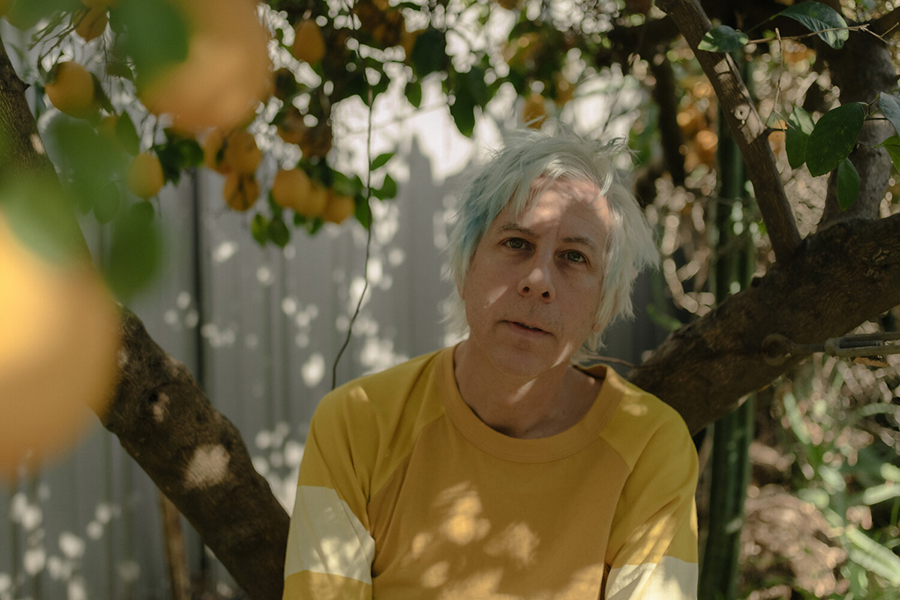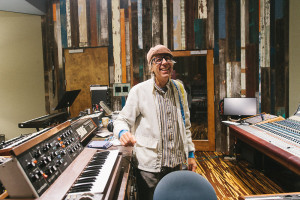Tiny Telephone Studios founder John Vanderslice starts anew in L.A.

John Vanderslice, Courtesy.
John Vanderslice is feeling good.
Calling from his kitchen of his Los Angeles home—the artist and producer relocated from San Francisco after shuttering Tiny Telephone in the City earlier this year—he’s just finished up recording a podcast for his Patreon account. It’s a new venture he’s embarked on in recent months, recording 40-minute podcast episodes set to their own musical score. His Patreon breaks down the hierarchy and allowing access to almost everything at the $1 level. It’s a modern technological and musical challenge that Vanderslice relishes. It’s also an upbeat feeling that Vanderslice hasn’t had since the early days of the pandemic, a time that left him questioning his own creative value.
“I think it made me way more mentally ill in the beginning,” Vanderslice said. “It just made me very unstable and non-functional.”
For most musicians, touring is a stabilizing influence, he said. It’s a controlled chaos and managed expectation from the hustle to prepare, rehearse and print merch to the daily grind of traveling to the venue and sound-checking. The schedule is “loopy” but also a predictable and comfortable space, he said.
Without the ability of touring, Vanderslice said he didn’t initially see the point of making a record.
“It took so long for me to realize I didn’t have this feedback loop thing; what am I going to do?” Vanderslice said. “It just felt weird and disconnected and made me super unhappy.”
Beyond simply the creative and professional struggles, Vanderslice said that the pandemic made everyone take a hard look at the state of the country.
“Whatever the promise of America was, we’ve burned that up a long time ago,” he said. “But there’s something about the pandemic where you’re confronted with just how busted this place is.”
The lack of diversions also made the President Donald Trump’s presence louder and more inescapable on a daily basis, and that influence, combined with the consistent scenes of civil unrest, became too much to handle, Vanderslice said.
“I was like, ‘Man I gotta get off this fucking carousel; this is a Stephen King fucking ride,'” he said.
In July, the longtime San Francisco resident closed up shop at his legendary Tiny Telephone studio in San Francisco and moved south. He said that the transition initially weighed heavily on him. The San Francisco studio was a mainstay for many indie and mainstream artists, including Death Cab For Cutie and Sleater-Kinney, and is known for its analog recording equipment. In 2016 he opened a second location in Oakland. It’s still open and overseen by others.
“Thank God the Oakland studio still exists; if all of the studios had closed at once, it just would have been too much for me,” Vanderslice said. “My identity and self-worth is so tied into that studio.”
Surprisingly, Vanderslice doesn’t look back forlornly at the closing of the original establishment, which marked 20 years in 2017.
“In a weird way, I’m not really sentimental. When something feels like it’s done, I’m OK to process it and close it,” Vanderslice said. “By the time it was actually closing, I had been dealing with it for a year, so it kinda felt good to me.”
While many employees now work at the Oakland studio, Vanderslice said he simply can’t employ as many people as he did with both studios. That’s the part that hits him hardest.
“I liked that it really had this community center vibe,” Vanderslice said. “But I think I’ve processed all the sadness a while ago.”

John Vanderslice photographed at Oakland Tiny Telephone Studios on Oct 15, 2016. Lorenz Angelo/STAFF.
He’s looking ahead now. He’s got a European tour lined up for May 2021, and looking ahead at a normalized future. He also changed his mind about not writing new music. During quarantine he recorded the aptly titled eeeeeeep! EP, which he released in August. It wasn’t easy getting back to being creative, but once the inspiration came, it led Vanderslice to challenge himself to try different things.
“It took me a while to shift into ‘creative and functional me’—it was really painful,” he said. “It took me awhile to recalibrate, but I feel like I’m really stable and happy now.”
Known for his work in analog recording, the pandemic forced Vanderslice to dig into digital recording—the stuff at his immediate disposal. There was a learning curve to the methods, he acknowledged. He is now pushing into more experimentation of “weird” sounds and non-linear writing stylings that are afforded by a digital set-up.
“I think I’m getting better at it,” he said.
Follow writer Mike DeWald at Twitter.com/mike_dewald.
